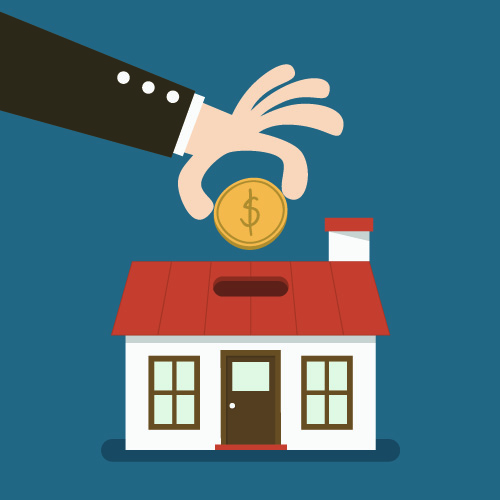Fall Home Maintenance Checklist
 It’s official – fall is here! Not only does that mean it’s time for pumpkin spice lattes and cozy sweaters, but it’s also time for fall home maintenance. With the weather changing from hot to cool, it’s time to prep your home for the fall and winter seasons. Taking care of routine maintenance helps ensure you don’t face more serious problems down the line. Here’s the rundown of those tasks you should complete in the coming weeks.
It’s official – fall is here! Not only does that mean it’s time for pumpkin spice lattes and cozy sweaters, but it’s also time for fall home maintenance. With the weather changing from hot to cool, it’s time to prep your home for the fall and winter seasons. Taking care of routine maintenance helps ensure you don’t face more serious problems down the line. Here’s the rundown of those tasks you should complete in the coming weeks.
Clean the gutters
Nobody likes to clean the gutters. But we’re willing to bet you’d like a damaged roof and a leaky basement even less. If this does happen then don’t fret- the experts at RainTech Roofing, Sheet Metal & Gutters – Tulsa sheet metal can take care of this sort of damage promptly and effectively. But what about maintenance you can take on yourself?
Well, now is the time to get up on a ladder and clean out those gutters. Depending on how many trees you have in your yard, this may be a task you need to complete a couple of times over the fall season. It may not look it at first, but it prevents damage actually. You may even realize that you’re going to need to install new seamless gutters.
Attend to the yard
In addition to gutter cleaning, it’s also time to attend to the yard. Prune trees and shrubs and clean up fallen leaves. If possible, compost your leaves for use in garden beds. It’s also time to aerate, fertilize and reseed your lawn so that it’s lush and green in the spring.
Drain garden hoses
If you don’t drain garden hoses, water can become trapped inside. If you live in an area where you can expect below freezing temperatures, this could cause that trapped water to freeze and expand. Come spring, you’ll need to buy new hoses. Stretch them out on a slope until they’re dry and then store them over the winter.
Store outdoor furniture
Before the chill really sets in, store or cover your outdoor furniture. This will ensure that you can use them for many more springs and summers to come.
Seal leaks
Take a walk around your home and use exterior caulk to seal any cracks around windows and doorframes, between siding and trim, and where wires or pipes enter your home. Not only does this prevent moisture from getting into your walls, but it also saves energy. If you discover slab leaks, you may need professional slab leak repair services.
Check the fireplace
If you have a fireplace, then you know how much use it gets in the cooler months. Make sure the damper works properly. Hire a professional to clean creosote buildup before you begin using your fireplace.
Check your heating system
The beginning of fall is the perfect time to change your furnace filter. You should also consider having a heating service professional come in to check your system. It’s better to discover an issue early rather than having an expensive repair down the line.
Check your detectors
With fireplaces, furnaces, and space heaters running in your home, you need to make sure all your detectors are working properly. This includes fire and carbon monoxide detectors. Check the batteries and replace as necessary. If you don’t already have one, purchase a fire extinguisher to have on hand just in case.
Test cold weather equipment
Finally, if you live in an area where you can expect snow, then take the time to test your snow blower. It’s much easier to have it repaired now than when there are six inches of snow on the ground and you can’t get out of your driveway.
Compliments of Virtual Results




 As a seller, you spend quite a bit of time preparing your home for the market. From decluttering and depersonalizing to making repairs and upgrades, you have plenty to do. Decluttering your house can seem like a challenging task, but you will organize your home without hassles if you do what is necessary. Since we live hectic lifestyles, clutter can build up fast, you may see these
As a seller, you spend quite a bit of time preparing your home for the market. From decluttering and depersonalizing to making repairs and upgrades, you have plenty to do. Decluttering your house can seem like a challenging task, but you will organize your home without hassles if you do what is necessary. Since we live hectic lifestyles, clutter can build up fast, you may see these 
 Would you be surprised to learn that
Would you be surprised to learn that  If you’re a homebuyer with kids, then you know there are certain basic requirements the home needs to provide. You want it to be safe, have a place to play, and be located in a good school district. But are there other characteristics you should be looking for when searching for a home, other than the basics? Here’s a look at what you should consider when buying a kid-friendly home.
If you’re a homebuyer with kids, then you know there are certain basic requirements the home needs to provide. You want it to be safe, have a place to play, and be located in a good school district. But are there other characteristics you should be looking for when searching for a home, other than the basics? Here’s a look at what you should consider when buying a kid-friendly home.
 When you’re preparing to put your home on the market, you want to make it as attractive as possible to potential buyers. But what you do – or don’t do – can either get buyers excited or turn them off. Knowing what buyers don’t want is crucial when it’s time to sell your home. Here’s a list of the most common homebuyer turnoffs that you need to avoid.
When you’re preparing to put your home on the market, you want to make it as attractive as possible to potential buyers. But what you do – or don’t do – can either get buyers excited or turn them off. Knowing what buyers don’t want is crucial when it’s time to sell your home. Here’s a list of the most common homebuyer turnoffs that you need to avoid.

 We’re nearing the end of the summer season. This means that many homebuyers have already put in an offer on a house and finished the closing process. But if you’re still house hunting, does that mean you’re out of luck? Fortunately, buying a home at the end of the summer can be a great benefit for those who are still looking. Here’s a look at what you should keep in mind when you’re out there house hunting right now.
We’re nearing the end of the summer season. This means that many homebuyers have already put in an offer on a house and finished the closing process. But if you’re still house hunting, does that mean you’re out of luck? Fortunately, buying a home at the end of the summer can be a great benefit for those who are still looking. Here’s a look at what you should keep in mind when you’re out there house hunting right now.

 Catch Our Feed
Catch Our Feed Subscribe via Email
Subscribe via Email Follow Our Tweets
Follow Our Tweets Friend Us On Facebook
Friend Us On Facebook Watch Us On Youtube
Watch Us On Youtube